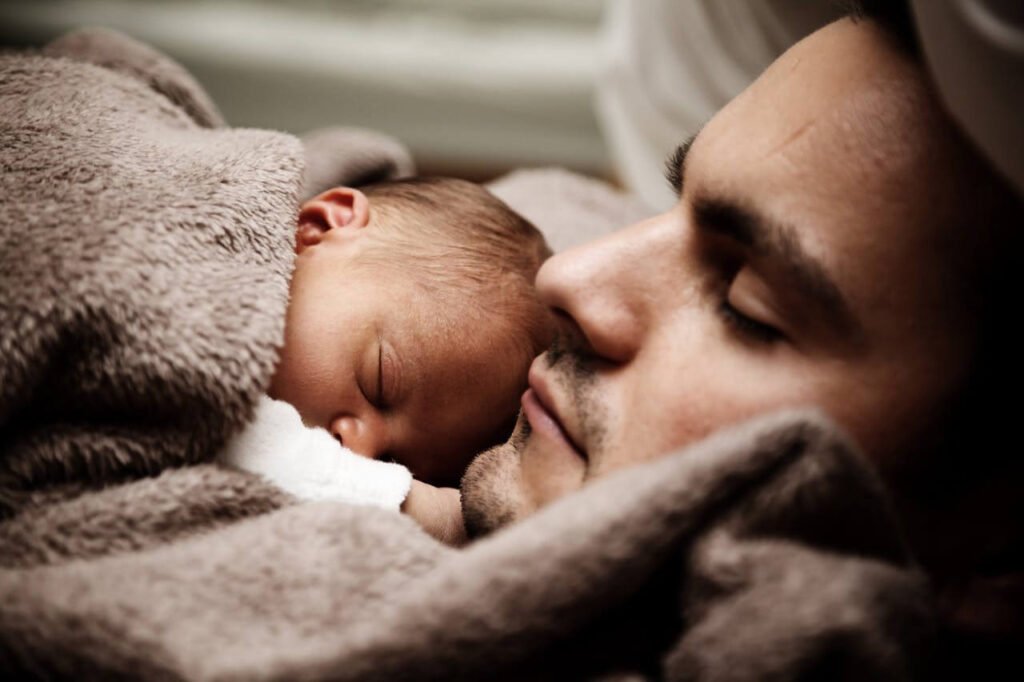Welcoming a new baby into your life is an exciting and joyous time. As a new dad, you’re likely thrilled with every milestone your baby achieves. From their first smile to those adorable babbling sounds, each moment feels like a victory. But just when you think you’ve got this parenting thing down, your little one might throw you a curveball: regressions. Yes, those perplexing periods where your baby seems to backtrack in their development, leaving you scratching your head and reaching for the coffee. But fear not, dear dads, for we’re here to decode the mysteries of baby regressions and arm you with strategies to weather the storm.
What are regressions?
Picture this: your once soundly sleeping baby suddenly starts waking up multiple times throughout the night, fussing and crying as if they’ve forgotten how to sleep. Or perhaps your little bundle of joy, who was happily cooing and engaging with you, suddenly becomes clingy and cranky, refusing to be put down for even a moment. Welcome to the world of baby regressions – those pesky periods of temporary setbacks in your baby’s development.
Regressions are temporary setbacks in a baby’s development that can occur at various stages during their first year. These regressions can affect different areas of development, including sleep, feeding, motor skills, and social interaction.
Types of Baby Regressions
Let’s dive into the different types of regressions you might encounter during your baby’s first year:
1. Sleep Regression: Ah, the dreaded sleep regression – every parent’s nightmare. Just when you thought you were getting the hang of bedtime routines, your baby decides to throw a curveball and start waking up more frequently at night. This typically occurs around 4 months, 8-10 months, and again around 12 months.
2. Developmental Regression: Your baby has been hitting all the milestones like a champ – until suddenly, they seem to hit a roadblock. Developmental regressions can manifest as a temporary slowdown or even a loss of previously acquired skills, such as rolling over, sitting up, or babbling.
3. Feeding Regression: Whether you’re breastfeeding or bottle-feeding, feeding regressions can throw a wrench into your carefully crafted feeding schedule. Your once voracious eater may suddenly become fussy at the breast or bottle, leading to frustration for both baby and parent.
4. Social Regression: Babies are social creatures, but they can also go through phases where they become more clingy or less interested in interacting with others. Social regressions can manifest as increased fussiness, separation anxiety, or a reluctance to engage with unfamiliar faces.
Sleep regressions
One of the most common regressions that parents may experience is sleep regression. Sleep regressions typically occur around 4 months, 8-10 months, and 18 months. During these periods, babies who were previously sleeping well may suddenly start waking up more frequently during the night or have difficulty falling asleep.
It’s important to remember that sleep regressions are a normal part of a baby’s development and are often associated with growth spurts or developmental milestones. While it can be challenging for parents, it is essential to be patient and provide comfort and reassurance to your baby during these times.

Feeding regressions
Feeding regressions can also occur during the first year of a baby’s life. These regressions can manifest as a sudden refusal to eat or a decrease in appetite. They can be caused by a variety of factors, including teething, illness, or a preference for new foods.
If your baby experiences a feeding regression, it’s important to offer a variety of healthy foods and continue to offer breast milk or formula to ensure they are getting the necessary nutrients. It’s also crucial to consult with your paediatrician if you have any concerns about your baby’s feeding habits.
Developmental regressions
Babies go through various stages of motor skill development in their first year, such as rolling over, sitting up, crawling, and walking. However, it is not uncommon for babies to experience regressions in these skills.
For example, a baby who has been crawling may suddenly stop and prefer to scoot or roll instead. These regressions are often temporary and can be a result of a growth spurt or a shift in focus to another area of development.
Social regressions
Social regressions can also occur during the first year of a baby’s life. Babies who were previously comfortable with strangers may suddenly become clingy or anxious in social situations. This regression is often referred to as “stranger anxiety” and is a normal part of a baby’s social development.
During this regression, it’s important to provide a secure and comforting environment for your baby. Gradually exposing them to new people and situations can help them overcome their anxiety and regain their social confidence.
What Causes Baby Regressions?
Now that we’ve identified the different types of regressions, let’s explore what might be causing these temporary setbacks in your baby’s development:
Growth Spurts
Just like teenagers who seem to sprout overnight, babies experience rapid growth spurts during their first year of life. These growth spurts can disrupt sleep patterns, feeding routines, and even social interactions as your baby’s body and brain work overtime to keep up with their changing needs.
Developmental Milestones
As your baby grows and develops, they’ll reach a series of milestones – from rolling over to sitting up to saying their first words. While these milestones are cause for celebration, they can also be accompanied by temporary regressions as your baby’s brain focuses its energy on mastering new skills.
Teething
Ah, teething – every parent’s milestone and nightmare! As those tiny teeth start to make their way through your baby’s gums, they can wreak havoc on sleep, feeding, and overall mood. Teething-related discomfort can lead to increased fussiness, nighttime waking, and a general sense of crankiness.

Environmental Changes
Babies are highly sensitive, and even small changes in their environment can throw them off course. From travel to changes in routine to disruptions in their usual surroundings, environmental changes can trigger regressions in sleep, feeding, and behaviour.
Signs of a Regression
So, how do you know if your baby is going through a regression? Here are some telltale signs to watch out for:
- Increased fussiness or irritability, especially during previously peaceful times like bedtime or mealtime.
- Changes in sleep patterns, such as waking up more frequently at night or refusing to nap during the day.
- Difficulty feeding, whether it’s breast refusal, bottle aversion, or a sudden decrease in appetite.
- Clinginess or separation anxiety, where your baby becomes more attached to you and reluctant to be put down.
- Temporary slowdown or loss of previously acquired skills, such as rolling over, sitting up, or babbling.
Tips for Handling Baby Regressions
Now that you know what to look for, let’s talk about how to handle those inevitable baby regressions like a pro:
Stay Calm
Remember, regressions are temporary setbacks and a normal part of your baby’s development. Take a deep breath, remind yourself that this too shall pass, and try to stay calm and patient.
Stick to Routine
Babies thrive on routine, so try to maintain a consistent schedule as much as possible, even during regressions. Stick to regular mealtimes, nap times, and bedtime routines to provide a sense of stability and predictability for your little one.
Provide Comfort
During regressions, your baby may need extra comfort and reassurance from you. Offer plenty of cuddles, gentle rocking, and soothing words to help them feel secure and loved during this challenging time.

Be Flexible
While routine is important, it’s also essential to be flexible and adapt to your baby’s changing needs during regressions. If your little one is having trouble sleeping, for example, be prepared to try different soothing techniques or adjust your bedtime routine as needed.
Seek Support
Remember, you’re not in this alone! Reach out to your partner, family members, friends, or other parents for support and encouragement during regressions. Sometimes just knowing that others have been through it too can make all the difference. Consult with your paediatrician if you have any concerns about your baby’s development.
Conclusion
In conclusion, baby regressions are a normal and temporary part of your little one’s development during the first year of life. By understanding the different types of regressions, what causes them, and how to handle them with grace and patience, you can navigate these challenging periods like a pro. Remember to stay calm, stick to routine, provide comfort, be flexible, and seek support when needed. And most importantly, cherish those precious moments with your baby, regressions and all, because before you know it, they’ll be in the middle of the next phase of growing up!

Leave a Reply